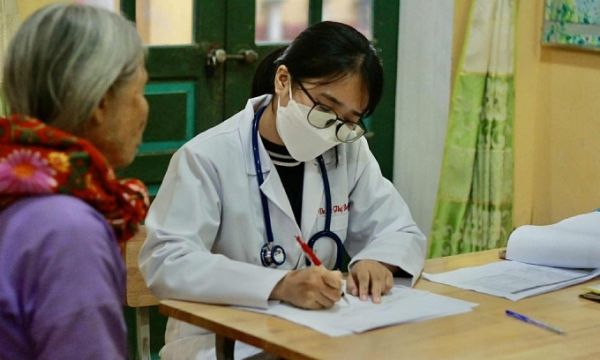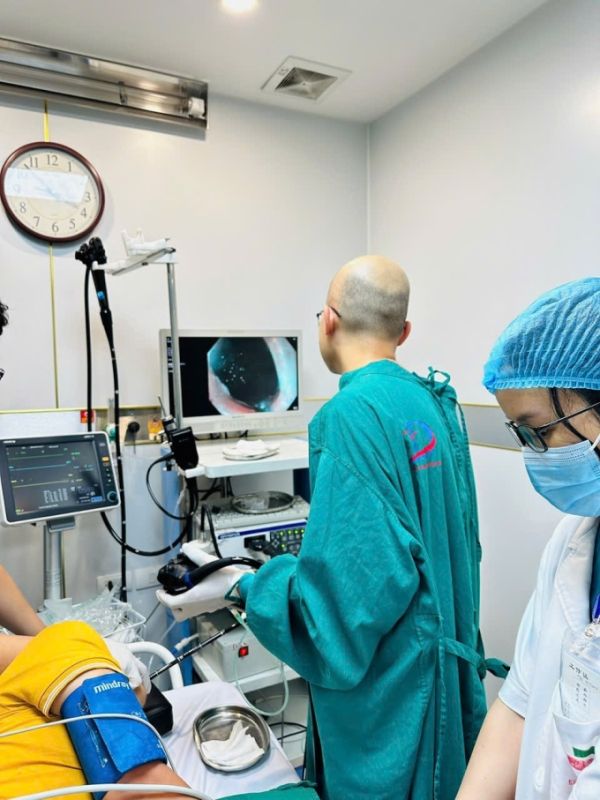
Residency is deemed the fastest way to become a top physician in Vietnam. This postgraduate program is open only to the cream of medical graduates who get one shot at an entrance exam.
Those who qualify spend three years working and studying under extreme pressure, guided by leading professors and doctors, gaining expertise that could take others decades.
The admission is through a very challenging exam.
In 2014 Hoang Van Chuong, then a recent gastroenterology graduate from the Hanoi Medical University, had to study 720 essay questions across six subjects to prepare. “By the time I got to question 700, I had already forgotten the first one,” the 35-year-old says. “Many took sedatives to focus, some quit halfway.”
|
Chuong poses for a photo before defending his residency thesis at the Hanoi Medical University in 2017. Photo by Read/Tu Le |
Chuong majored in internal medicine, which covers cardiology, gastroenterology, nephrology, and hematology, and pulmonology besides musculoskeletal treatment.
Residents in this field are trained in systematic thinking, diagnosis and coordination. Only 12 from more than 100 residents in his class chose internal medicine, and four, including Chuong, worked in the gastroenterology department.
By the time he began his residency large bald patches had appeared on his head. “Most residents lose weight, look older and either go gray or bald,” he says.
Chuong worked around 10 night shifts a month, each lasting 24 hours. He often stayed at the hospital until 10 p.m. On some days he would go home only at 3 a.m. before returning to the hospital at 7 a.m.
His department had over 150 patients, and he had to keep track of all of them. “If anything went wrong, the professors would call out us residents first,” he says.
Residents would often be criticized in front of patients and colleagues. Emergency shifts were the most stressful, with several critical patients arriving at once. “Sometimes while resuscitating one patient, another would suddenly worsen,” Chuong says.
Chuong was nicknamed “walking stick” since he stood 1.7 meters tall but weighed only 56 kilograms.
In his final year of residency he dated a junior colleague. “There was no time to meet anyone outside the hospital,” he says. Their schedules were too demanding, and the relationship ended.
|
Ngoc examines patients during a work trip to Yen Bai Province in 2023. Photo courtesy of Le Thi Bich Ngoc |
Le Quynh, wife of the 42th class of resident doctor, says she only realized how difficult residency was after living with her husband, Nguyen.
They were childhood friends who married when he started his residency, she says. “We had just gotten married, but he was on duty three nights a week. Even on nights without shifts, he stayed at the hospital until 10 p.m., came home and went straight to sleep.”
One evening Quynh came home and knew her husband was asleep inside, but he did not answer the door despite her knocking. “I knocked so hard I broke the lock, but he did not wake up. Over an hour later he got up, saw me cooking, asked one question, and went back to sleep.”
On many occasions she has woken up because he was shouting in his sleep, as if giving orders in the emergency room.
The pressure is even greater for female residents like Le Thi Bich Ngoc, 26.
Once, at 10 p.m., after a brief lull at the A9 emergency department at Bach Mai Hospital in Hanoi, she had stepped out for a quick meal. She returned 20 minutes later to find the patient chart colored red, the highest alert level.
The room was tense with the constant beeping of monitors and urgent, clipped commands.
Three doctors were taking turns performing CPR and other life-saving measures on a patient whose heart had stopped before he was brought in. Ngoc assisted for 40 minutes until the monitor finally showed signs of life. It brought her to tears.
“The patient was in his early 30s. His parents, wife and children were waiting outside. When I saw his heart beating again, I knew my work was worth it.”
Ngoc is now in her third year of residency, specializing in internal medicine with a focus on musculoskeletal care. “Internal medicine gives me the foundation I need for research, teaching or specialization later on.”
For the past three years she has supported the Bach Mai Hospital’s A9 emergency unit and Hanoi Medical University Hospital.
Working in places where life and death are only seconds apart, she faces severe pressure from mentors, colleagues and patients’ families.
Ngoc’s schedule is as grueling as her male colleagues’. Her day starts at 7 a.m. and ends at 10 p.m., and there are three night shifts each week.
On some nights she only sleeps for two to three hours. Residents have no summer break and very limited time off during the Lunar New Year. On many nights she just collapses into her bed and falls into a deep sleep instantly. “We often joke that we live only for night shifts,” she says.
She is lucky to have a husband who supported her for five years, she says. They married earlier this year but decided to put off having kids until after she graduates.
Most residents avoid starting families because of the workload, and many have never been in a relationship. In the past marriage was rare for residents and pregnancy was almost taboo. “Residency is tough but it is a meaningful journey every doctor wants to experience,” Ngoc said.
She sees it as a test of strength, endurance and knowledge that makes her more confident and resilient on the path to becoming a skilled doctor.
 |
|
Dr Chuong (in blue) performs an endoscopy on a patient at a clinic in Sept. 2025. Photo by Tu Le |
Chuong achieved his dream of becoming a doctor but his hair never grew back, and he simply decided to shave his head “to look better.”
After working at Bach Mai, he moved to a private hospital in Hanoi to continue practicing while having more time for his family and planning for a second child.
Quynh and her husband moved to Thanh Hoa Province. He now teaches at Hanoi Medical University’s Thanh Hoa campus and also works at the provincial hospital. Quynh runs a small pharmacy at home while caring for their child.
“After all the hardships, I’m happy that my husband can now fulfil his lifelong dream of supporting our family and helping many patients,” she says.